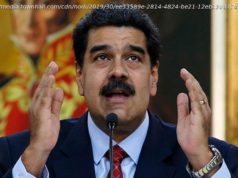Former cricket star Imran Khan was sworn in as prime minister of Pakistan on Saturday, taking on the challenge of forming a coalition to govern as a currency crisis looms over the turbulent, nuclear-armed South Asian country.
ISLAMABAD (Reuters) — Former cricket star Imran Khan was sworn in as prime minister of Pakistan on Saturday, taking on the challenge of forming a coalition to govern as a currency crisis looms over the turbulent, nuclear-armed South Asian country.
Khan, a firebrand nationalist, won a general election last month promising to fight corruption and drastically reduce poverty among Pakistan’s 208 million mostly-Muslim people.
Wearing a traditional black sherwani coat, in the style of his hero and Pakistan founder Muhammad Ali Jinnah, Khan recited the oath of office and vowed to respect the constitution.
“I will bear true faith and allegiance to Pakistan,” Khan read from the oath, standing next to President Mamnoon Hussain.
Later, he was given a guard of honor on the lawns of the prime minister’s house.
Military coup’s have punctuated Pakistan’s 71-year history, and Khan’s election was only the second democratic transfer of power. If he completes his five-year term he will be the first Pakistani prime minister to do so.
His Pakistan Tehreek-e-Insaf (PTI), or Justice Party, holds 151 of the 342 seats in the national assembly, where a vote was held on Friday to decide who would be asked to form a government.
Khan easily defeated rival Shehbaz Sharif from the outgoing Pakistan Muslim League-Nawaz (PML-N) party, garnering 176 votes to Sharif’s 96 votes.
Pakistan has been plagued by economic boom-and-bust cycles as well as by Islamist militant violence in more recent years.
And one of Khan’s first calls as prime minister will be figuring out how to deal with a looming currency crisis that threatens to derail an economy growing at around six percent annually.
The new coalition government must urgently decide whether to ask the International Monetary Fund (IMF) for a bailout, or seek support from China, the country Pakistan regards as its most reliable ally.
Relations with the United States are frayed, with U. S. officials fuming over Pakistan’s alleged support Taliban fighters in Afghanistan. Islamabad denies aiding the insurgents.
The oath-taking was attended by scores of Pakistani celebrities, sportsmen, and politicians, as well as former Indian cricketer Navjot Singh Sidhu, who serves as tourism minister for India’s Punjab province.
Khan has promised to create millions of jobs and build world-class hospitals and schools in a country where more than 40 percent of the population is illiterate.
After spending much of his political career on the fringes, the Oxford-educated former sportsman rose to power on a populist platform, and in recent years his anti-corruption message has increasingly resonated with Pakistanis, especially the young.
Khan’s opponents say he owes his ascent to covert support from the country’s powerful military, though both the army and Khan deny collusion.






